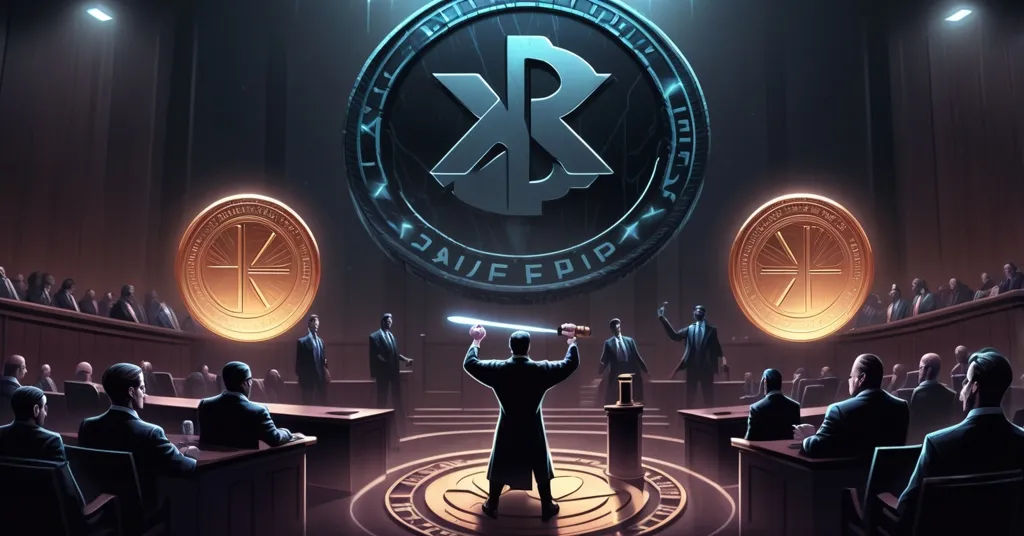Ripple’s XRP Sales Post-2018 Dodge SEC Rules in Ongoing Legal Battle

Ripple’s XRP Sales Post-2018: Dodging SEC Rules Amid a Brutal Legal Fight
Ripple’s legal brawl with the US Securities and Exchange Commission (SEC) over XRP sales feels like a never-ending bear market, but a recent court ruling throws them a bone—though it’s hardly a victory lap. The injunction slams Ripple’s pre-2018 institutional sales as unregistered securities worth $728 million, yet their post-2018 strategies seem to slip through the regulatory cracks. With the SEC’s appeal still kicking in 2025 and a shifting regulatory horizon, Ripple’s path forward is anything but clear.
- Court’s Hammer: Injunction hits pre-2018 institutional XRP sales, labeled unregistered securities at $728 million.
- Post-2018 Play: Ripple’s revised sales tactics aim for compliance, sidestepping past mistakes.
- Battle Rages On: SEC appeal drags into 2025, casting a shadow over any temporary wins.
The Backstory: Ripple’s Regulatory Nightmare
For those just tuning in, Ripple’s clash with the SEC started in December 2020 when the agency accused the company of selling XRP as an unregistered security since 2013, pocketing over $1.3 billion without the proper filings. An unregistered security, in plain English, is when a company sells something that acts like an investment—think stocks promising returns based on the issuer’s efforts—without registering it with the SEC or getting an exemption. Ripple argued XRP is a digital currency, not a security, much like Bitcoin or Ethereum. A pivotal moment came in July 2023 when Judge Analisa Torres ruled that while institutional sales (direct deals with big-money players) violated securities laws, programmatic sales (public trades on exchanges) did not. This split decision gave Ripple some breathing room but left the SEC hungry for more. For a deeper dive into the background of this case, check out the comprehensive overview on Ripple Labs’ legal history.
Pre-2018 Blunder: A Costly $728 Million Gamble
The SEC’s beef centers on Ripple’s institutional XRP sales from 2013 to 2018, direct deals with hedge funds and other heavyweights totaling $728 million. The court found these broke Section 5 of the Securities Act, which mandates registration for securities unless exempt. Basically, Ripple was caught hawking investment contracts without the paperwork, gambling on crypto’s early regulatory gray zone. The 2023 injunction specifically forbids repeating this structure—about 3% of their XRP holdings back then—but it’s not a total lockdown on institutional sales. If Ripple plays by new rules, they’ve got wiggle room. To understand more about the broader context of such regulations, see this discussion on SEC rules for unregistered securities in crypto.
Legal minds like Fred Rispoli have hammered this point home. The injunction is narrow; it’s about how those old deals were done, not a blanket ban. James Farrell, another voice in crypto law, suggests Ripple could seek a “no-action letter” from the SEC—a bureaucratic nod saying, “Do this specific thing, and we won’t come after you.” It’s not a full endorsement, just a shield for a targeted move, but it could keep Ripple’s institutional cash flow alive if they’re smart.
Fred Rispoli: The injunction zeros in on pre-2018 sales structures, not all institutional deals. Ripple can still operate if they adapt and comply.
James Farrell: Following Section 5 of the Securities Act, or snagging a no-action letter, could keep Ripple’s institutional sales in the clear.
Post-2018 Shift: Real Change or Regulatory Lip Service?
Since 2018, Ripple appears to have gotten the memo. They’ve ditched the shadowy deal-making of their early days for a more transparent approach, engaging regulators and even hinting at filing registration statements to align with securities laws. Their business still focuses on XRP as a bridge currency for cross-border payments via RippleNet, partnering with regulated financial entities worldwide—a use case where Bitcoin’s slower speeds and higher fees often stumble. But let’s not get too cozy. Ripple’s massive escrow holdings, releasing XRP in controlled bursts, scream centralization, a cardinal sin to Bitcoin maximalists who worship at the altar of leaderless, trustless systems. Is this pivot genuine evolution or just a polished front to placate the SEC? The jury’s out, and skeptics smell PR spin over substance. For more on how these post-2018 efforts align with regulatory expectations, read about Ripple’s compliance with SEC conditions for XRP sales.
Still, Ripple’s efforts stand out in a space where too many projects thumb their nose at rules until they crash and burn in a scam-fueled fireball. Their willingness to at least try compliance is a step up, even if it’s driven by survival instinct rather than ideological purity. But don’t break out the confetti—regulatory wolves are still circling, and a cleaner playbook doesn’t mean a free pass. Insights into their strategic shift can be found in discussions around post-2018 institutional sales compliance.
SEC Appeal: A Grinding War of Attrition
The SEC isn’t rolling over. As of early 2025, their appeal against the 2023 programmatic sales ruling—declaring public XRP trades on exchanges aren’t securities—trudges through the Second Circuit Court of Appeals. They dropped their opening brief on January 15, 2025, insisting even these secondary market sales deserve securities scrutiny. Ripple, buying time, pushed their response deadline to mid-April, stretching the uncertainty thinner than a memecoin’s fundamentals. Former SEC lawyer Marc Fagel dangles a shred of hope, suggesting the agency might ditch the appeal, especially with new leadership in play. But lawyer Bill Morgan throws cold water on quick resolutions, noting even a settlement needs another SEC vote—a bureaucratic slog in a maze of red tape. For the latest on this ongoing appeal, follow updates and expert takes at SEC appeal status in the Ripple case.
Marc Fagel: The SEC might eventually drop the appeal, but it’s still very much alive. Don’t count on a swift ending.
Bill Morgan: A settlement isn’t a done deal; another SEC vote is required, and that’s a hurdle in this procedural swamp.
So, is Ripple just dodging bullets for now, or staving off a fatal blow? The appeal’s outcome could redraw the map for altcoins on exchanges. If the SEC backs off or loses, programmatic sales might be locked in as non-securities, a huge shield for secondary markets and retail traders. But if they win, brace for a freeze—altcoins could face harsher rules, and US exchanges might delist tokens faster than you can say “rug pull.” XRP’s price, already a yo-yo with a market cap bouncing between $30-40 billion on legal news, could crater further, rattling holder confidence.
SEC Leadership Shakeup: Light at the Tunnel’s End?
Here’s where it gets juicy: the SEC’s top brass is changing. Gary Gensler, the former chair who became crypto’s public enemy number one with his enforcement-heavy approach, stepped down in 2025. Acting Chairman Mark Uyeda and nominee Paul Atkins, pending confirmation, have both slammed the SEC’s past “regulation by enforcement” as a disaster for innovation—basically, making rules via lawsuits instead of clear guidelines. Add Commissioner Hester Peirce, aka “Crypto Mom,” leading a new Crypto Task Force, and pro-crypto political tailwinds from figures like Donald Trump and Senator Cynthia Lummis, and the SEC might be nudged toward dialogue over destruction. Explore how this shift might affect cases like Ripple’s at SEC leadership changes and crypto regulation.
For Ripple, this could be a game-changer, softening years of relentless pressure. A less hostile SEC might prioritize frameworks over fights, but let’s not overdose on optimism. Bureaucracies grind slower than a Bitcoin transaction during a fee spike, and the SEC’s investor protection mandate won’t vanish. Plus, Ripple’s centralized setup will always draw more side-eye than Bitcoin’s untouchable, decentralized purity.
Retail Investors: Caught in the Legal Crosshairs
Spare a thought for the everyday XRP holder. Retail investors have ridden a nauseating rollercoaster with each legal update. Post-2023 ruling, XRP briefly soared past $0.80, only to slump as appeal news dragged. Trading volumes on platforms like Binance and Coinbase—both in their own SEC dogfights—spike and dip with courtroom headlines, reflecting raw uncertainty. Beyond price, there’s a deeper trust issue: centralized altcoins like XRP, tethered to a company’s fate, feel shakier than Bitcoin, where no CEO can be hauled into court. If the SEC appeal tightens the noose, delistings or trading curbs could hit retail portfolios hard. On the flip side, a Ripple win might inject confidence into altcoin markets, showing centralized projects can weather the storm. For community perspectives on this uncertainty, see this discussion on the impact of the SEC lawsuit on XRP investors.
Bitcoin vs. Altcoins: A Regulatory Divide
Zoom out, and Ripple’s saga spotlights a brutal divide. Bitcoin, birthed by an anonymous genius and sustained by a global, leaderless network, often skates by as a commodity under the Commodity Futures Trading Commission (CFTC), dodging the SEC’s securities hammer. Altcoins like XRP, Cardano, or Solana, tied to founding teams or companies, aren’t so fortunate. Ripple’s escrow control over XRP supply—doling out tokens on a schedule—makes it a prime target for securities claims. To Bitcoin maximalists, this screams vindication: centralization invites trouble, so why mess with corporate coins when BTC offers unadulterated freedom? Fair point, but let’s not write off altcoins. XRP’s knack for fast, cheap remittances and Ethereum’s smart contract empire tackle niches Bitcoin doesn’t prioritize. If Ripple’s programmatic sales ruling holds, altcoin innovation could thrive. If not, expect a US talent drain as projects bolt for friendlier shores.
Community Hype vs. Cold, Hard Reality
Crypto forums and social feeds are abuzz with talk of Ripple settlements or dropped appeals, but let’s not snort the hopium. Some misread Ripple’s compliance steps as admitting guilt, a take Bill Morgan has obliterated—settlements are often just pragmatic, not surrender. Others ignore the messy grind of legal procedure, fantasizing about instant closure while the SEC’s gears churn slower than a congested blockchain. Even if Ripple’s post-2018 moves look spotless, the SEC could still dig up fresh gripes. With giants like Binance and Coinbase also tangled in regulatory cage matches, the agency’s crypto stance is a dartboard with no bullseye. Every step forward hides a potential tripwire. Community opinions on these issues are heated, as seen in this Reddit thread on XRP as unregistered securities. For the most recent developments, keep up with Ripple’s ongoing legal battle with the SEC.
Key Questions and Takeaways for Crypto Fans
- What does the court injunction actually block for Ripple?
It restricts only the structure of pre-2018 institutional XRP sales, flagged as unregistered securities worth $728 million. New sales are possible if done with compliance in mind. - Can Ripple still deal XRP to big investors without getting burned?
Yes, if they stick to securities laws and maybe grab a “no-action letter” from the SEC to confirm specific moves won’t spark enforcement. - Is the Ripple-SEC showdown close to ending in 2025?
Not by a long shot. The SEC’s appeal on programmatic sales rolls on, with filings into mid-2025, and settlements still need extra bureaucratic steps like additional votes. - Could new SEC leadership ease up on Ripple and crypto?
Pro-crypto figures like Mark Uyeda and Paul Atkins might lighten enforcement, potentially cutting Ripple some slack and crafting clearer blockchain rules, but change won’t be overnight. - Why does this hit altcoins harder than Bitcoin?
Bitcoin’s decentralized roots often label it a commodity, dodging securities heat, while altcoins like XRP, linked to central entities, face tougher scrutiny—Ripple’s fate could shape altcoin destiny. - How are retail investors feeling the Ripple legal heat?
XRP holders deal with price swings and trust wobbles tied to legal updates, risking delistings or trading limits if the SEC clamps down, though a win could lift altcoin morale.
Ripple’s post-2018 sales might duck the SEC’s current punches, but they’re still in the ring with a heavyweight. Their strategic shift hints at a rare readiness to dance with regulators—more than you can say for scam-riddled projects that implode under scrutiny. Yet, the dragging appeal and bureaucratic quicksand prove the US crypto regulatory scene is still a lawless frontier, even if the sheriffs seem less trigger-happy lately. Bitcoin maximalists might smirk, seeing this as proof BTC’s decentralized supremacy reigns, but altcoins like XRP aren’t just corporate clutter—they push financial innovation into corners Bitcoin doesn’t touch. Ripple’s fight could forge a survival guide for other altcoins under fire, or it might just be another bloody chapter in crypto’s war for legitimacy. Will their moves rewrite the rules, or simply postpone the reckoning?



